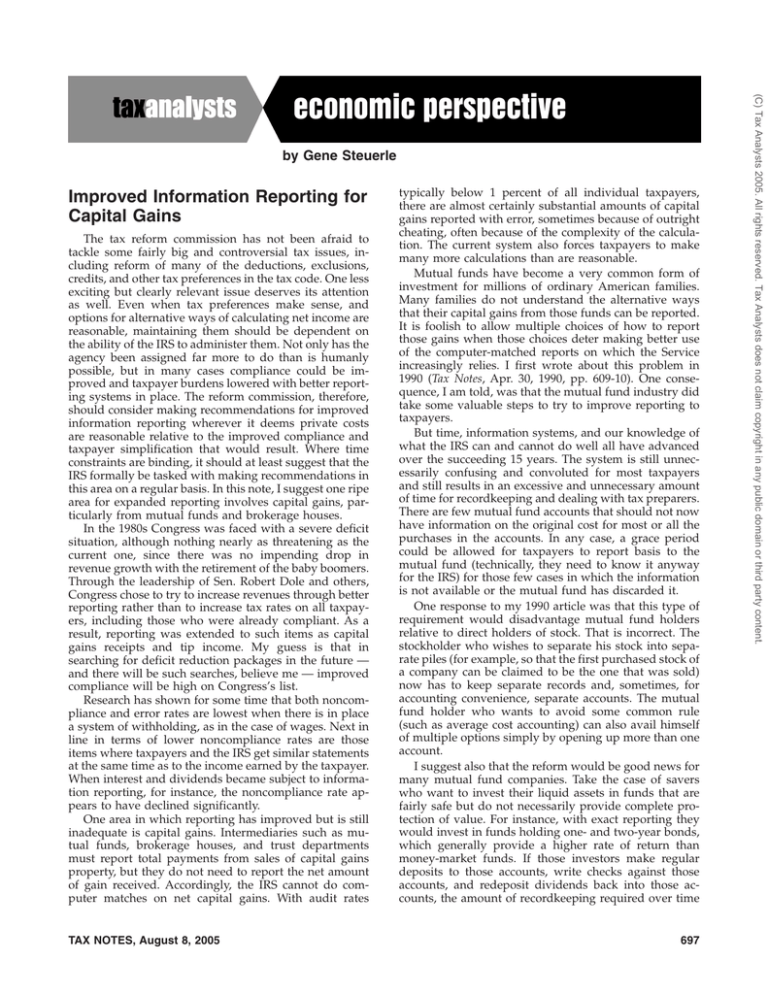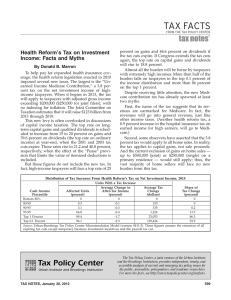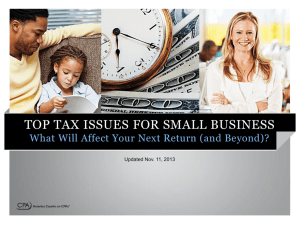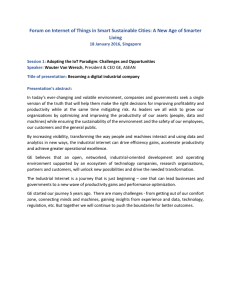
Improved Information Reporting for
Capital Gains
The tax reform commission has not been afraid to
tackle some fairly big and controversial tax issues, including reform of many of the deductions, exclusions,
credits, and other tax preferences in the tax code. One less
exciting but clearly relevant issue deserves its attention
as well. Even when tax preferences make sense, and
options for alternative ways of calculating net income are
reasonable, maintaining them should be dependent on
the ability of the IRS to administer them. Not only has the
agency been assigned far more to do than is humanly
possible, but in many cases compliance could be improved and taxpayer burdens lowered with better reporting systems in place. The reform commission, therefore,
should consider making recommendations for improved
information reporting wherever it deems private costs
are reasonable relative to the improved compliance and
taxpayer simplification that would result. Where time
constraints are binding, it should at least suggest that the
IRS formally be tasked with making recommendations in
this area on a regular basis. In this note, I suggest one ripe
area for expanded reporting involves capital gains, particularly from mutual funds and brokerage houses.
In the 1980s Congress was faced with a severe deficit
situation, although nothing nearly as threatening as the
current one, since there was no impending drop in
revenue growth with the retirement of the baby boomers.
Through the leadership of Sen. Robert Dole and others,
Congress chose to try to increase revenues through better
reporting rather than to increase tax rates on all taxpayers, including those who were already compliant. As a
result, reporting was extended to such items as capital
gains receipts and tip income. My guess is that in
searching for deficit reduction packages in the future —
and there will be such searches, believe me — improved
compliance will be high on Congress’s list.
Research has shown for some time that both noncompliance and error rates are lowest when there is in place
a system of withholding, as in the case of wages. Next in
line in terms of lower noncompliance rates are those
items where taxpayers and the IRS get similar statements
at the same time as to the income earned by the taxpayer.
When interest and dividends became subject to information reporting, for instance, the noncompliance rate appears to have declined significantly.
One area in which reporting has improved but is still
inadequate is capital gains. Intermediaries such as mutual funds, brokerage houses, and trust departments
must report total payments from sales of capital gains
property, but they do not need to report the net amount
of gain received. Accordingly, the IRS cannot do computer matches on net capital gains. With audit rates
TAX NOTES, August 8, 2005
typically below 1 percent of all individual taxpayers,
there are almost certainly substantial amounts of capital
gains reported with error, sometimes because of outright
cheating, often because of the complexity of the calculation. The current system also forces taxpayers to make
many more calculations than are reasonable.
Mutual funds have become a very common form of
investment for millions of ordinary American families.
Many families do not understand the alternative ways
that their capital gains from those funds can be reported.
It is foolish to allow multiple choices of how to report
those gains when those choices deter making better use
of the computer-matched reports on which the Service
increasingly relies. I first wrote about this problem in
1990 (Tax Notes, Apr. 30, 1990, pp. 609-10). One consequence, I am told, was that the mutual fund industry did
take some valuable steps to try to improve reporting to
taxpayers.
But time, information systems, and our knowledge of
what the IRS can and cannot do well all have advanced
over the succeeding 15 years. The system is still unnecessarily confusing and convoluted for most taxpayers
and still results in an excessive and unnecessary amount
of time for recordkeeping and dealing with tax preparers.
There are few mutual fund accounts that should not now
have information on the original cost for most or all the
purchases in the accounts. In any case, a grace period
could be allowed for taxpayers to report basis to the
mutual fund (technically, they need to know it anyway
for the IRS) for those few cases in which the information
is not available or the mutual fund has discarded it.
One response to my 1990 article was that this type of
requirement would disadvantage mutual fund holders
relative to direct holders of stock. That is incorrect. The
stockholder who wishes to separate his stock into separate piles (for example, so that the first purchased stock of
a company can be claimed to be the one that was sold)
now has to keep separate records and, sometimes, for
accounting convenience, separate accounts. The mutual
fund holder who wants to avoid some common rule
(such as average cost accounting) can also avail himself
of multiple options simply by opening up more than one
account.
I suggest also that the reform would be good news for
many mutual fund companies. Take the case of savers
who want to invest their liquid assets in funds that are
fairly safe but do not necessarily provide complete protection of value. For instance, with exact reporting they
would invest in funds holding one- and two-year bonds,
which generally provide a higher rate of return than
money-market funds. If those investors make regular
deposits to those accounts, write checks against those
accounts, and redeposit dividends back into those accounts, the amount of recordkeeping required over time
697
(C) Tax Analysts 2005. All rights reserved. Tax Analysts does not claim copyright in any public domain or third party content.
by Gene Steuerle
COMMENTARY / ECONOMIC PERSPECTIVE
698
in excess of the amount of additional tax due. The
advancement of computers and accounting systems by
brokerage and other firms must be used to simplify
reporting here. I suggest, therefore, that each firm be
required to report a figure to the taxpayer for the gains on
the account holding that stock, using one single legislatively required method. Specific identification of which
stock was sold would no longer be allowed within any
one account. Once again, a grace period can be allowed
for taxpayers to report basis to those firms who do not
have the information available. And, once again, it is
painfully obvious that this is the only way the IRS will
ever be able to attain high compliance levels and minimum error rates on net gains from sales of stocks with
multiple purchase dates.
Still, some flexibility must be allowed. A taxpayer, for
instance, could hold the same stock with two different
brokerage companies, just as he could hold similar stock
with two different mutual fund companies. Each brokerage may be able to report one number for capital gains
for any one account, but would have no way of knowing
whether that was, say, the average cost basis for all stocks
held by the individual. So be it. If a taxpayer wants to go
to the trouble of opening multiple accounts, let him.
Stopping him probably cannot be enforced easily.
As with all information reporting, there would still be
some exceptions for which the individual taxpayer
would be required to make adjustments, as in the case of
wash sales across accounts. And some transition rules
inevitably would be required. For the vast majority of
transactions, however, the net capital gains report would
be used just as are reports on dividends and interest by
most taxpayers. Accuracy rates, I am confident, would
shoot up almost immediately.
The main goals of this proposal are simplification for
the taxpayer and an improvement in compliance. The IRS
could match net gains from information reports with
what taxpayers report on their returns, taxpayers would
not be faced with multiple choices, they would not have
to pay extra fees to their tax preparers to track down
additional data, and financial intermediaries would get
fewer requests for information from taxpayers at the end
of the year. When it comes to capital gains reporting, it
really is time to move forward.
TAX NOTES, August 8, 2005
(C) Tax Analysts 2005. All rights reserved. Tax Analysts does not claim copyright in any public domain or third party content.
for what on average amounts to zero capital gains can be
extraordinary. My guess is that many simply do not
report those gains correctly, or don’t invest in the funds
because of the complicated tax calculations that would be
required — and that the IRS auditors, as well, check up
on those calculations even less than for other capital
gains because of the modest amount likely to be at stake
and because of the time-consuming complications they
themselves would face in cross-checking the taxpayers’
information.
Fortunately, many mutual funds are now offering to
provide a calculation of net gains to the shareholder if he
wants it. But the IRS still has no report on which to match
net gains. For that type of fund, money in and out can be
very high relative to gains received (which tend to be
zero or relatively small). It’s time to take the next step:
With few exceptions, give taxpayers one number to file
with the IRS and be done with it. And give the IRS a
number it can administer.
Because so many taxpayers make use of mutual funds,
I suggest mutual fund reporting reform even in the
absence of other capital gains reporting reform. Nonetheless, I also suggest that brokerage houses and other
financial intermediaries also be required to begin reporting net capital gains to the IRS. To achieve that goal, it is
also necessary to move toward one system of reporting
for capital gains for multiple purchases of the same stock
— at least within any one account. The reasons are
similar to those expressed above for mutual funds —
most brokerage houses and financial intermediaries now
have the information in place to do the job. And if they
don’t, they are not serving their customers well, especially at the end of the year when those customers call
them for help in reporting capital gains on their tax
returns. For that matter, reform would probably relieve
them of much expensive communication with customers
over how to calculate basis and net gains to be reported
to the IRS.
Take a taxpayer who buys and sells stock on occasion,
but also participates in a dividend reinvestment plan.
Again, the amount of recordkeeping can be extraordinary, if done by hand, over time. And the taxpayer who
doesn’t know what to do or doesn’t have the time to do
it may pay some accountant unnecessary fees simply to
make the calculations. The fees themselves can easily be



